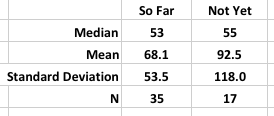When either candidate wins a state, that candidate's supporters celebrate and underscore the significance of that win. The other candidate's supporters generally proceed to explain how it was not a significant win, or in some cases, come up with conspiracy theories about how the election was stolen.
So, here is an interesting question: Does one candidate or another, between Hillary Clinton and Bernie Sanders, tend to win bigger states more, or smaller states more? This is important because next Tuesday is the New York Primary, and New York is huge. Of course, state size is not the only factor, and indeed, state size is probably related to a lot of other factors that may be more directly related. Still, it may be interesting to see what this all means.
Some of the largest states are in the future (New York, Pennsylvania, and California). The largest states, on average, are ahead with a very sightly higher median, and a more impressively larger mean. Here are the stats:
And here is a histogram, showing the size distribution of states (delegate count) so far and not yet voting in this primary season:
Large states matter more, numerically. If a candidate has a very small bias towards winning big states, but the two candidates otherwise split the wins, the candidate with the bias wins. More concretely, imagine each candidate wins or loses by 10%, and the distribution of wins and losses is exactly even for both candidates, but one candidate wins the largest three states and the other candidate wins the smallest three states, then a very substantial gap will result between the candidates. In a winner take all scenario, in this race, with Clinton winning the largest states and Sanders winning the smaller states, this would result in a final pledged delegate count of about 1406 for Sanders and 2306 for Clinton!
So, does one candidate win more in large states? Yes. Here is state size (as number of pledged delegates) against the percent difference between the candidates with Clinton upward on the graph, Sanders downward on the graph.
Clinton won, so far, the four biggest states and the fifth biggest state was a near tie. (Clinton also won more small states, but the effect of large states is greater, as noted).
Does this, by itself, mean that Clinton is going to win New York and California? No, of course not. This is just one factor, and as noted, probably relates or correlates to other factors such as diversity, various kinds of activism, overall political gestalt in the state, and so on.



Excellent, and thank you. It seems to me Ms Clinton will get more votes than Senator Sanders in New York, by about 6%. The online "polls" show Sanders winning and losing. Heh.
What are the age demographics for "large states?" Do the high-population states have older voters than the smaller states?
One predictions market shows Clinton at 90% but I think it will be much closer. I bought 500 "No" shares at 10 cents each, since it's too good a deal to pass up in case Sanders gets the majority.
I also think Clinton will be the party-nominated candidate, and I also think she will be elected president. (Heavy sigh.) But I have placed $409 on Sanders, and if he is elected president I will profit about $2,550.
I don't know about age, I'd rather doubt that. But many larger states get larger through immigration (so in Florida, the immigrants are older northerners) and that increases both political diversity and ethnic diversity.